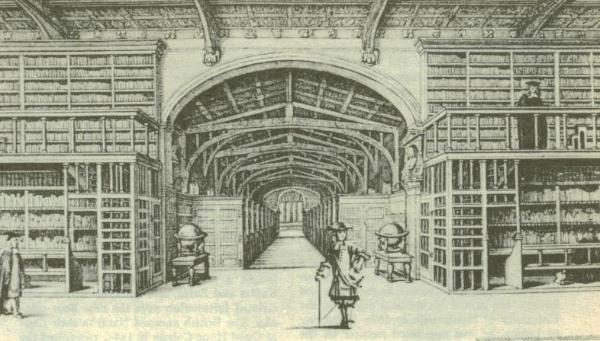About libraries and the history of libraries.
A Library is a collection of books or other material, kept for reference or study, and, by extension, the place or building where such a collection is maintained. The earliest know libraries were collections of royal, sacerdotal, and commercial archives, made in ancient Babylonia and Egypt. Although only clay and stone tablet have been preserved in substantial numbers from the earliest times, several papyrus rolls dating from the 4th millennium B.C. have been found, and the inscriptions on clay and stone make reference to co-existing libraries of papyrus books. For example, a tomb near the great pyramids bears an inscription referring to the library, or "collected works" of Khufu. In ancient Mesopotamia libraries formed part of nearly every temple and royal palace, and more than 50,000 tablets have been discovered, dealing with such subjects as history, tradition, songs, prayers, philosophy, medicine, and law. Many of the temples of ancient Egypt had libraries of papyrus rolls; two notable royal libraries were those of Ikhnaton and Osymandyas (Ramses II). The most famous library of antiquity, however, was that formed at Alexandrian by the Ptolemies.
Ancient Libraries
The first public library in ancient Greece was reputedly founded by Pisistratus of Athens about 540 B.C. The poet Euripides, the mathematician Euclid, and the Philosopher Aristotle had private libraries. The kings of Pergamum collected books persistently, expropriating collections which could not be obtained by voluntary sale or gift; they amassed a library of 200,000 volumes which was taken by the Romans in 133 B.C. At Rome, libraries were derived chiefly from the spoils of war. The library of the Kings of Macedon was brought to Rome by AEmilius Paulus in 167 B.C. lucullus was noted for his extensive collection of books, and in 39 B.C. Gaius Asinius Pollio founded the temple of Libertas, the first public library in Rome with the spoils of his Parthian victories. Augustus, Tiberius, and later emperors continued the foundation and maintenance of public libraries.
As the Christian Church came to possess a distinct literature, small collections of books were established in the important churches, and more extensive libraries were developed, especially in the monasteries.
Middle Ages Libraries
During the Middle Ages, when the disruption of the Roman Empire and repeated invasions of barbarians caused an eclipse of learning and the destruction of literature, the monasteries furnished a refuge for scholars and books. The Benedictines were the most active of the monastic orders in the preservation of literature, and their collections, the most notable of which was founded at Monte Cassino in 530 A.D., formed the center of many later libraries. The first library in England, that of Christ Church in Canterbury was a gift of Pope Gregory I, brought to England in 596 A.D. by Saint Augustine, first archbishop of Canterbury.
Renaissance Libraries
At the beginning of the Renaissance, libraries were found at the great universities of Europe: at the Sobbonne in 1253, Bologna in 1323, Prague in 1348, and Heidelberg in 1386; at Oxford libraries founded in 1337 and 1412 were destroyed, but the Bodleian Library, founded in 1598, survives.
The growth of humanism and the revival of learning renewed interest in the collection of ancient manuscripts and led to the formation of many libraries. Especially notable among the collectors of the time were the Florentine banker Cosimo de'Medici who formed the foundation of the great medician library; King Charles V of France, whose collection formed the nucleus of the Bibliotheque National at Paris; and Frederick Duke of Urbino, whose collection survives in the Vatican library. In the same century the invention of printing gave a tremendous impetus to the making and collecting of books, and marks he beginning of the modern period of library development.
American Libraries
The earliest American library was that of Nenrico College, established by the colonists of Virginia in 1621 and destroyed in a Native Indian attack the next year. The library founded in 1638 by John Harvard is still part of Harvard University and has become one of the largest University libraries in the world. In 1700 a municipal public library was established in New York City. During the 18th century the library developed extensively as an independent institution, due chiefly to the establishment of subscription libraries; the first of these was the the Library Company of Philadelphia, founded in 1732 by Benjamin Franklin. The Library of Congress was established in 1800.
The principle of tax-supported public libraries was first formulated in the New York District Library Law, enacted in 1835. The extension of that principle by state and local governments during the next hundred years resulted in expansion of the free public library system so as to provide facilities for more than eighty percent of the population. The movement was aided by large donations by many philanthropists, the most notable being those of the American manufacturer Andrew Carnegie, who contributed a total of $64,000,000 to the construction of nearly 1700 library buildings.
Concurrently with the development of general libraries, special libraries were formed by organizations in particular fields. Colleges and Universities accumulated large collections of books, periodicals, and pamphlets particularly suited to their needs; professional societies gathered libraries devoted to social fields such as medicine, law, engineering, and technology; State governments established libraries of reference material as aids in legislation.
